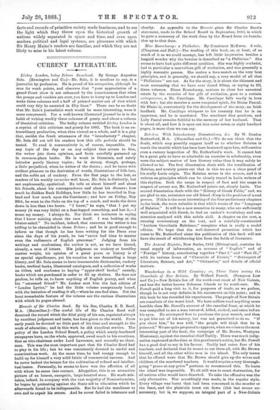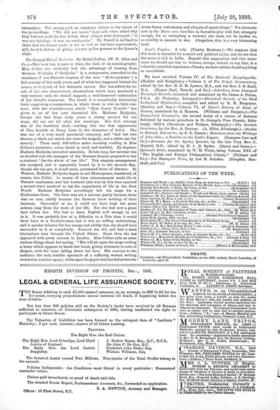Wanderings in a Wild Country ; or, Three Years •
among the Cannibals of New Britain. By Wilfred Powell. (Sampson Low and Co.)—New Britaiu lies off the north-east coast of New Guinea, and has the better known Solomon Islands to its south-east. Mr. Powell paid a long visit to it, for purposes of trade, as we gather, though he is not very definite in his statements on this point ; and in this book he has recorded his experiences. The people of New Britain are cannibals of the worst kind. We have seldom read anything more horrible than Mr. Powell's account of the cannibal feast, at which he was compelled to see a man tortured, killed, cooked, and eaten before his eyes. Ile attempted first to purchase the poor wretch, and then to put him out of his misery, but was not permitted to do so. "If you shoot him," he was told, "the people will think that he is poisoned." We are quite prepared to approve, when we come to the most interesting part of the book, the campaign of Mr. Brown, Wesleyan Missionary, against the cannibal chief Tarlily. There was much indig- nation expressed at the time at this gentleman's action, but Mr. Powell has a good deal to say in his favour. Tarlily had eaten four of his teachers, and declared that he meant to eat them all, with Mr. Brown himself, and all the other white men in the island. The only terms that he offered were that Mr. Brown should give up the wives and children of the murdered teachers. It would require a very thorough- going "peace-at-any-price n partisan to recommend this. To leave the island was impossible. To sit still was to court destruction, for all natives alike would have deserted. To take the offensive was the only alternative. War accordingly was made, in the regular style. Every village was burnt that had been concerned in the murder or the feast, and the plaintain trees eat down (this last seems un- necessary, but is, we suppose, an integral part of a New-Britain campaign). The enemy paid an emphatic tribute to the vigour of the proceedings. "We did not know," they said, when asked why they had not paid the fine before their villages were destroyed ; " it was not fighting,—it was an earthquake." Mr. Powell is inclined to think that the labour trade is not so bad as has been represented ; still, he is in favour of giving greater police powers to the Qaeen's ships.



































 Previous page
Previous page